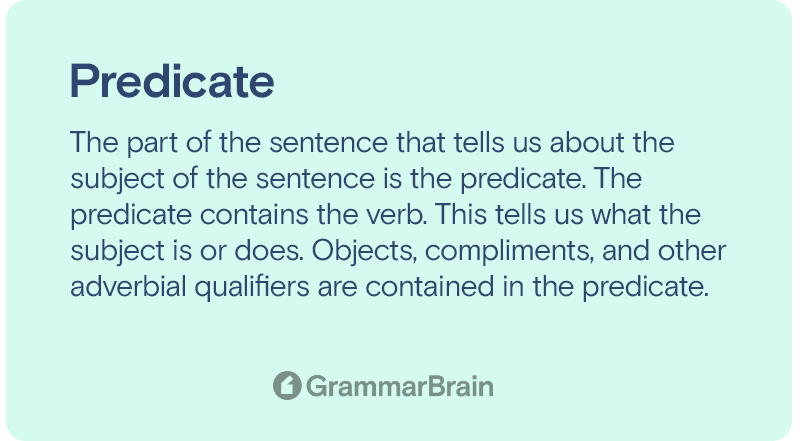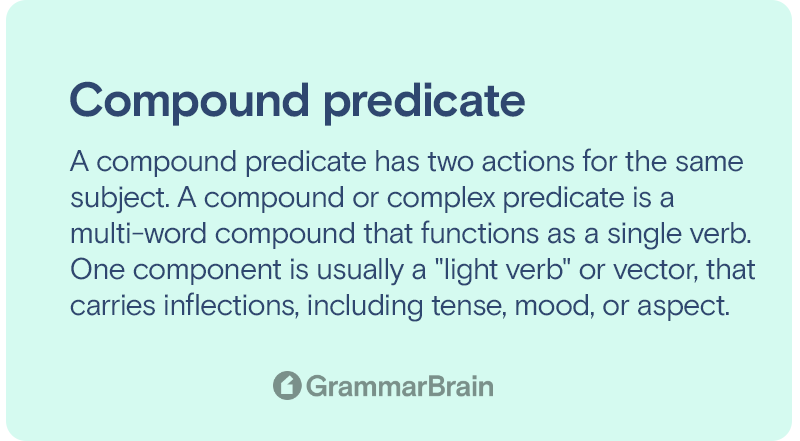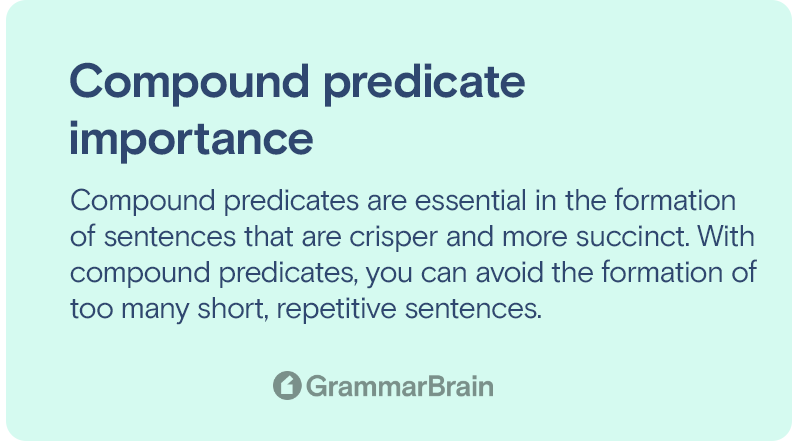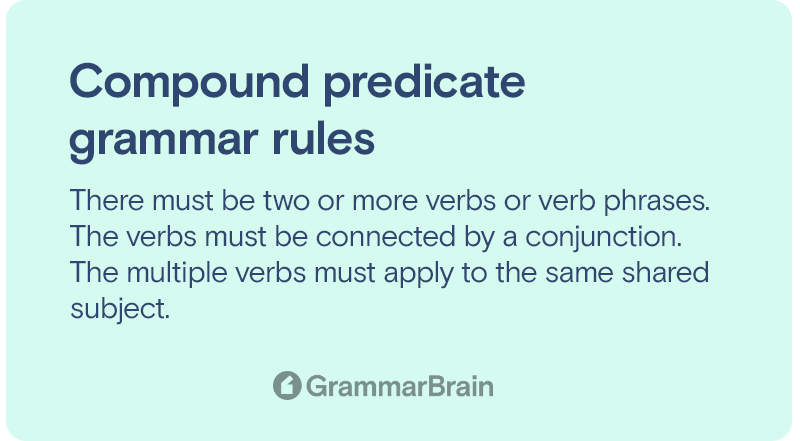

What is a compound predicate? How does a compound predicate work? And what are the grammar rules that govern a compound predicate? These are all great questions that will get answered in this comprehensive English grammar guide.

A compound predicate has two actions for the same subject. A compound or complex predicate is a multi-word compound that functions as a single verb. One component is usually a “light verb” or vector, that carries inflections, including tense, mood, or aspect.
Subject and predicate are two of the most important parts of any sentence.

A compound predicate is a kind of predicate which has two or more verbs with a conjunction connecting them. These verbs provide information about the same subject (singular or compound).
| Form | Definition |
| Compound predicate | A compound predicate is when two verbs share the same subject. ‘Sam acts suspiciously and talks to no one’ is an example of a compound predicate. |
A complete subject refers to the major part of a sentence. There is at least one noun (or a part of speech equivalent to it) and all the modifiers associated with it.
A complete predicate refers to the remaining part of a sentence consisting of a verb and all its associated auxiliaries and modifiers. It provides an idea about what is being said about the subject (singular or compound).
While you can easily divide a sentence into subject and predicate, it is slightly more difficult to figure out what a compound predicate is.
Put simply, a compound predicate consists of two separate actions for one subject.
In a sentence, you have to look out for a subject that is performing two actions, and et voila, you have a compound predicate. If two or more verbs have the same subject, then the sentence has a compound predicate.
The following are some examples of subject and predicate in a sentence. These will help you in getting a clear understanding of complete subjects and predicates in a sentence.
Here, Mary forms the complete subject, while the rest of the sentence (including the verb ‘is’) forms the predicate.
Here, ‘The woman in the blue dress’ forms the complete subject, while the rest of the sentence (including the verb ‘has’) forms the predicate.
Here, ‘Always up for a challenge, Harry’ forms the complete subject, while the rest of the sentence (including the verb ‘is playing’) forms the predicate.
Here, ‘Ron and Emily’ forms the complete subject, while the rest of the sentence (including the verb ‘will leave’) forms the predicate.
The following are some examples of compound predicates in sentences. They will give you a clear understanding of how compound predicates are different from simple predicates and how you can easily identify them in a given sentence.
Here, ‘plays the piano and makes watercolour paintings’ makes up the compound predicate with the conjunction ‘and’ joining them.
Here, ‘has the groceries but does not know which house to deliver them’ makes up the compound predicate with the conjunction ‘but’ joining them.
Here, ‘is helping at the soul kitchen on Tuesday and holding a garage sale on Saturday’ makes up the compound predicate with the conjunction ‘and’ joining them.
Here, ‘will complete their trip, come back home and get back to their usual life’ make up the compound predicate with the conjunction ‘and’ joining them.
Compound predicates can be formed by simple predicates alone. In this case, simple predicates consist of the main verbs and their auxiliaries without the presence of any modifiers.
The following are some examples of compound predicates formed by simple predicates alone:
Here, ’jogs and runs’ form the compound predicate, with ‘jogs’ and ‘runs’ separate simple predicates.
Here, ’reads and writes’ form the compound predicate, with ‘reads’ and ‘writes’ being separate simple predicates.
Here, ‘bakes and decorates’ form the compound predicate, with ‘bakes’ and ‘decorates’ being separate simple predicates.
It is easy to mistake compound predicates and compound sentences. However, the following tips will help you to distinguish between them easily.
Compound sentences are made up of two or more independent clauses. Clauses that can exist without each other as complete sentences are called independent clauses. These clauses have subjects of their own. They are separated by a conjunction. Commas can also be used to separate compound sentences.
Compound predicates, on the other hand, include two or more verbs that give details about the same subject. They also have a conjunction connecting them, but the conjunction here does not connect independent clauses.
The following are some examples of compound sentences to help you in differentiating between compound sentences and compound predicates.
Here, ‘Sally plays hockey’ and ‘Sam plays cricket’ are independent clauses connected by the conjunction ‘and.’ They form a compound sentence together.
Here, ‘The man in the blue shirt played the guitar’ and ‘the audience sang along with the tune’ are two independent clauses connected by the conjunction ‘and.’ They form a compound sentence together.
Here, ‘The musical event will take place today’ and ‘the food festival will take place tomorrow’ are two independent clauses connected by the conjunction ‘and.’ They form a compound sentence together.

Compound predicates are essential in the formation of sentences that are crisper and more succinct. With compound predicates, you can avoid the formation of too many short, repetitive sentences.
Compound predicates help understand where the comma has to be used and where it is not required.
The following are some examples.
Here, there is one subject (Joan) and two verbs. There is also no comma before ‘but’. So, this is a compound predicate.
Here, there are two subjects (Joan and she). There is a comma before the ‘but.’ The clauses could serve as independent sentences. So, this is a compound sentence, not a compound predicate.
Say two sentences come one after the other (adjacent) and have the same subject. To avoid clutter, merge them.
The following is an example:
These sentences can easily be clubbed into the following sentence:

The following are some grammar rules that govern the compound predicate and must be taken into account:
The three types of predicates include simple predicate, compound predicate, and complete predicate.
Do compound predicates need a comma?No, compound predicates do not need a comma. Introducing a comma indicates a compound sentence.
What is a compound predicate example?An example of the compound predicate is – Yasmin jumped on her bicycle and pedaled off to the market.
Inside this article

Fact checked:
Content is rigorously reviewed by a team of qualified and experienced fact checkers. Fact checkers review articles for factual accuracy, relevance, and timeliness. Learn more.

Dalia Y.: Dalia is an English Major and linguistics expert with an additional degree in Psychology. Dalia has featured articles on Forbes, Inc, Fast Company, Grammarly, and many more. She covers English, ESL, and all things grammar on GrammarBrain.